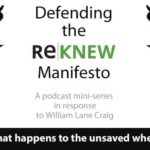We run our website the way we wished the whole internet worked: we provide high quality original content with no ads. We are funded solely by your direct support. Please consider supporting this project.

Hellbound? in the Washington Post
Kevin Miller, the writer/director of “Hellbound?” was featured in the Washington Post in an article titled “Hell is a reality distortion field.” He challenges us to consider that what we believe about hell or anything else is partially conditioned by many things other than just the Bible. This reality distortion field prevents us from considering other views seriously because we are so locked into our respective points of view. Greg often refers to this by saying “The map is not the territory” meaning that we often react to our ideas about things rather than the thing itself. Kevin’s article is a call to approach truth claims with humility, knowing that to some extent or another we are all unable to see the assumptions that keep us distanced from what is real.
Check out the film Hellbound? if you can. It’s a remarkable, thought-provoking look at the various views of hell (especially the traditional view of hell as eternal, conscious torment and the universalist view that all will eventually be saved) and the real-life consequences of those views, especially in terms of our willingness to participate in violence and our attitudes towards others.
Category: General
Tags: Heaven and Hell, Hellbound, Theology
Related Reading

Podcast: Do You Believe in Purgatory?
Greg reconsiders purgatory and pushes back, a little bit, against the protestant reformers. http://traffic.libsyn.com/askgregboyd/Episode_0111.mp3

If the violent depictions of God in the Bible are not completely accurate, isn’t all of Scripture up for debate?
Question: I’m very intrigued by your cruciform hermeneutics and can’t wait for your book (Crucifixion of the Warrior God) to come out. But I have to say that it strikes me as dangerous. You’re basically saying that the violent portraits of God in the OT are not completely accurate. But doesn’t this place us flawed…

ReThinking the Source of Life
Over the next few weeks, we will be exploring the twelve convictions of the ReKnew Manifesto. The first of which focuses on where we get life. In many of my writings, I speak about the source of “life.” By this I mean one’s core sense of identity, worth, significance and security. Over the years, I’ve…

The Case for Annihilationism
Annihilationism is the view that whoever and whatever cannot be redeemed by God is ultimately put out of existence. Sentient beings do not suffer eternally, as the traditional view of hell teaches. While I am not completely convinced of this position, I think it is worthy of serious consideration. In this essay I will present…

Changing Your Mind
Mark Moore is a man who has changed his mind about a lot of things which is somewhat extraordinary these days. Change can be costly and painful and this was certainly true for Mark. He previously pastored Providence Community Church in Plano, TX, where he pastored for eleven years based upon a set of theological assumptions…

Podcast: Defending the Manifesto (9 of 10 )
Greg responds to challenges by William Lane Craig from Craig’s podcast “Reasonable Faith.“ Greg discusses annihilationism. http://traffic.libsyn.com/askgregboyd/Episode_0064.mp3
